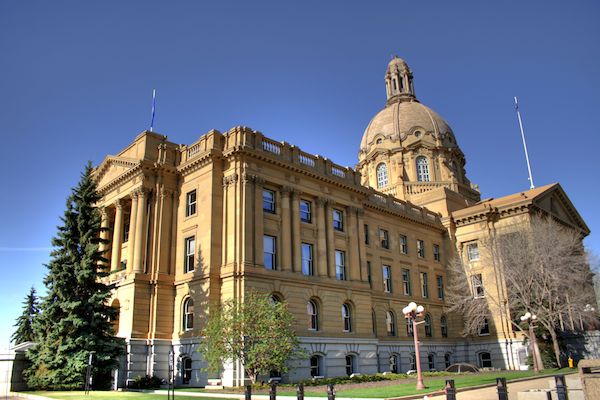Alberta
Albertans to vote on senators, equalization, daylight saving time

Albertans will have an opportunity to have their say on equalization and daylight saving time and elect nominees to the Senate when they vote in the fall municipal elections.
In addition to voting for Senate nominees, Albertans will be asked to vote on these two provincial topics on Oct. 18, in conjunction with the municipal elections:
- Equalization payments – Should the principle of making equalization payments be removed from the Constitution?
- Daylight saving time – Should Alberta end the practice of changing our clocks twice a year?
“Alberta has a long and proud tradition of grassroots, direct democracy. We will renew that tradition this fall. I encourage all Albertans to get engaged on these important issues and I look forward to taking part in the debate this fall.”
Equalization
Over the last 25 years, Albertans have contributed more than $400 billion more to the nation in tax dollars than they have received in federal spending. Albertans make an immense contribution to equalization through federal tax contributions, which are transferred by the federal government to other provinces for programs and services. The current program has many issues, including a formula that requires it to grow automatically with Canada’s economy, even if contributing provinces like Alberta are experiencing immense economic challenges.
Daylight saving time
Across Canada and the United States, more governments are bringing forward legislation to move to permanent daylight saving time, also known as summer hours. In 2019, Service Alberta asked Albertans if they thought we should make a similar shift. More than 141,000 Albertans responded, of which 91 per cent were in favour of year-round summer hours.
“Changing our clocks twice a year is something that every Albertan has an opinion on. As Alberta first adopted daylight saving time following a referendum in 1971, we owe it to Albertans to give them the same opportunity to make their voices heard now that we are considering another change.”
Senate elections
Along with the municipal elections and the two referendum questions this fall, Albertans will elect three Senate nominees – one for each of the two current vacancies and one in case of early retirement.
The Senate nominee election enhances democracy in the province by allowing Albertans to choose the individuals who will best represent them in Parliament. Having representatives elected by Albertans would increase senators’ accountability to Alberta voters to defend the province’s interests.
Provincial police and pension
For the topics of creating an Alberta Police Service and Alberta Pension Plan, further analysis and work are underway before next steps are determined.
“Through the Fair Deal Panel, Albertans who are policed by the RCMP said that they want to see Alberta build its own provincial police service to improve policing in their communities. We are continuing to study what this could look like and how it could improve the safety and security of Albertans and their property, as part of making an informed decision on the next steps.”
“The potential creation of an Alberta Pension Plan would be a significant decision for Albertans. As such, we are continuing the important work of completing an actuarial, economic and structural analysis so Albertans can make an educated and well-informed choice, and their questions and concerns can be adequately addressed. We look forward to putting this important decision on the table when the time is right.”
Quick facts
- The equalization question will be: “Should Section 36(2) of the Constitution Act, 1982 –Parliament and the Government of Canada’s commitment to the principle of making equalization payments – be removed from the Constitution?”
- Between 2014 and 2019 alone, Albertans made a net contribution of more than $100 billion to the federal government through federal taxes that helped build critical infrastructure.
- Alberta has not received an equalization payment since the 1964-65 fiscal year.
- The question on daylight saving time will be finalized this summer.
- During 2019 and 2020, legislation was tabled in British Columbia and Ontario to move to summer hours all year. These changes have yet to be implemented.
- In March 2020, the Yukon stopped changing their clocks and adopted Pacific daylight time year-round.
- Since 2018, 17 American states have passed legislation to move to summer hours (daylight saving time) permanently and more states are debating the topic. However, in the United States, federal approval is required to enact the change.
- Saskatchewan, Arizona and Hawaii do not change their clocks twice a year.
- The Government of Alberta would provide names of elected Senate nominees to the prime minister for consideration when filling Senate vacancies.
Alberta
Big win for Alberta and Canada: Statement from Premier Smith

Premier Danielle Smith issued the following statement on the April 2, 2025 U.S. tariff announcement:
“Today was an important win for Canada and Alberta, as it appears the United States has decided to uphold the majority of the free trade agreement (CUSMA) between our two nations. It also appears this will continue to be the case until after the Canadian federal election has concluded and the newly elected Canadian government is able to renegotiate CUSMA with the U.S. administration.
“This is precisely what I have been advocating for from the U.S. administration for months.
“It means that the majority of goods sold into the United States from Canada will have no tariffs applied to them, including zero per cent tariffs on energy, minerals, agricultural products, uranium, seafood, potash and host of other Canadian goods.
“There is still work to be done, of course. Unfortunately, tariffs previously announced by the United States on Canadian automobiles, steel and aluminum have not been removed. The efforts of premiers and the federal government should therefore shift towards removing or significantly reducing these remaining tariffs as we go forward and ensuring affected workers across Canada are generously supported until the situation is resolved.
“I again call on all involved in our national advocacy efforts to focus on diplomacy and persuasion while avoiding unnecessary escalation. Clearly, this strategy has been the most effective to this point.
“As it appears the worst of this tariff dispute is behind us (though there is still work to be done), it is my sincere hope that we, as Canadians, can abandon the disastrous policies that have made Canada vulnerable to and overly dependent on the United States, fast-track national resource corridors, get out of the way of provincial resource development and turn our country into an independent economic juggernaut and energy superpower.”
Alberta
Energy sector will fuel Alberta economy and Canada’s exports for many years to come

From the Fraser Institute
By any measure, Alberta is an energy powerhouse—within Canada, but also on a global scale. In 2023, it produced 85 per cent of Canada’s oil and three-fifths of the country’s natural gas. Most of Canada’s oil reserves are in Alberta, along with a majority of natural gas reserves. Alberta is the beating heart of the Canadian energy economy. And energy, in turn, accounts for one-quarter of Canada’s international exports.
Consider some key facts about the province’s energy landscape, as noted in the Alberta Energy Regulator’s (AER) 2023 annual report. Oil and natural gas production continued to rise (on a volume basis) in 2023, on the heels of steady increases over the preceding half decade. However, the dollar value of Alberta’s oil and gas production fell in 2023, as the surging prices recorded in 2022 following Russia’s invasion of Ukraine retreated. Capital spending in the province’s energy sector reached $30 billion in 2023, making it the leading driver of private-sector investment. And completion of the Trans Mountain pipeline expansion project has opened new offshore export avenues for Canada’s oil industry and should boost Alberta’s energy production and exports going forward.
In a world striving to address climate change, Alberta’s hydrocarbon-heavy energy sector faces challenges. At some point, the world may start to consume less oil and, later, less natural gas (in absolute terms). But such “peak” consumption hasn’t arrived yet, nor does it appear imminent. While the demand for certain refined petroleum products is trending down in some advanced economies, particularly in Europe, we should take a broader global perspective when assessing energy demand and supply trends.
Looking at the worldwide picture, Goldman Sachs’ 2024 global energy forecast predicts that “oil usage will increase through 2034” thanks to strong demand in emerging markets and growing production of petrochemicals that depend on oil as the principal feedstock. Global demand for natural gas (including LNG) will also continue to increase, particularly since natural gas is the least carbon-intensive fossil fuel and more of it is being traded in the form of liquefied natural gas (LNG).
Against this backdrop, there are reasons to be optimistic about the prospects for Alberta’s energy sector, particularly if the federal government dials back some of the economically destructive energy and climate policies adopted by the last government. According to the AER’s “base case” forecast, overall energy output will expand over the next 10 years. Oilsands output is projected to grow modestly; natural gas production will also rise, in part due to greater demand for Alberta’s upstream gas from LNG operators in British Columbia.
The AER’s forecast also points to a positive trajectory for capital spending across the province’s energy sector. The agency sees annual investment rising from almost $30 billion to $40 billion by 2033. Most of this takes place in the oil and gas industry, but “emerging” energy resources and projects aimed at climate mitigation are expected to represent a bigger slice of energy-related capital spending going forward.
Like many other oil and gas producing jurisdictions, Alberta must navigate the bumpy journey to a lower-carbon future. But the world is set to remain dependent on fossil fuels for decades to come. This suggests the energy sector will continue to underpin not only the Alberta economy but also Canada’s export portfolio for the foreseeable future.
-

 2025 Federal Election1 day ago
2025 Federal Election1 day agoWEF video shows Mark Carney pushing financial ‘revolution’ based on ‘net zero’ goals
-

 Crime2 days ago
Crime2 days agoFirst Good Battlefield News From Trump’s Global War on Fentanyl
-

 2025 Federal Election1 day ago
2025 Federal Election1 day agoThree cheers for Poilievre’s alcohol tax cut
-

 2025 Federal Election1 day ago
2025 Federal Election1 day agoMORE OF THE SAME: Mark Carney Admits He Will Not Repeal the Liberal’s Bill C-69 – The ‘No Pipelines’ Bill
-

 2025 Federal Election1 day ago
2025 Federal Election1 day ago‘Coordinated and Alarming’: Allegations of Chinese Voter Suppression in 2021 Race That Flipped Toronto Riding to Liberals and Paul Chiang
-

 Break The Needle1 day ago
Break The Needle1 day agoWhy psychedelic therapy is stuck in the waiting room
-

 2025 Federal Election1 day ago
2025 Federal Election1 day agoDon’t let the Liberals fool you on electric cars
-

 International2 days ago
International2 days agoTrump’s ‘Golden Dome’ defense shield must be built now, Lt. Gen. warns










